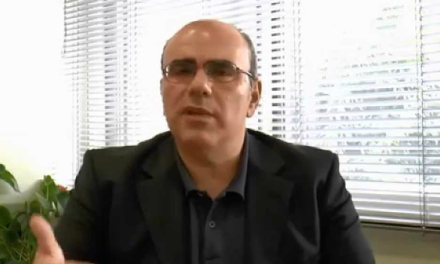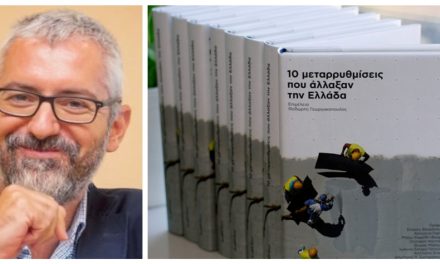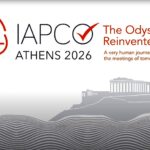Epaminondas Christofilopoulos is Head of the UNESCO Chair on Futures Research in the Foundation for Research and Technology Hellas (FORTH) and has been recently appointed the Deputy-Chair of the Foresight Unit inside the Presidency of the Greek Government. He has an academic background in Physics and Environmental Studies, and hols a PhD in International Relations and Foresight. Since 2010 he has focused on future studies and on seting up the Foresight Unit in PRAXI Network/FORTH. His research interests cover the future of the innovation landscape in China and the development of serious games for scenario exploration and long-term strategic planning.
Epaminondas Christofilopoulos spoke to Rethinking Greece* on the concepts of foresight and future literacy; the seven megatrends that will impact Greece in the coming decades as identified by the Foresight Team; projects such as establishing a State of the Future Index in Greece; the covid-19 pandemic as a ‘black swan’ event; the importance of long-term strategies at the centre of policy making and finally, how the global power shift from the West to Asia brings about a multi-polar global environment, where building regional alliances and dialogue is crucial for peace and prosperity.
You hold the UNESCO chair on Futures Research at Forth Institute; this chair is part of UNESCO’s initiatives on “foresight” and “futures literacy”. Could you talk to us about these new concepts, and why they are important?
The field of futures studies has a relatively short history. The idea of exploring the future in a more creative way started in the 40s with the RAND Corporation in USA. RAND produced reports on the future of military technology, strategy and especially produced various cold war scenarios. Nevertheless, in the next decades the field thrived with the developed of various methods for the industry as well as movements focusing on peace research.
The main difference in future studies is that we don’t do forecasting, we never predict what the future might bring, because the future is unpredictable. The methods used in future studies are mainly qualitative and use collective intelligence to investigate probable, possible, and plausible images of the future. The foresight methods allow us to scan the horizon for trends, driving forces, and weak signals, to analyze the system and the various cross impacts, and finally to produce normative or exploratory scenarios for the future.
In the academic sector, a flagship moment was the creation, in Paris, of the Centre International de Prospective, by the French philosopher Gaston Berger (1896-1960), who also coined the term “prospective”, that is also the basis of the Greek term «Προοπτική Διερεύνηση». Currently, there are hundreds of academic and executive programs on future studies around the world, but the field is practically non-existing in the Greek academic institutions. The positive news is that we have started the design of a Master’s program on Strategic Foresight in a Greek University that will be soon be available starting the next academic year.
The newest development in the discipline of future studies, is the introduction of the concept of Futures Literacy, that is backed by UNESCO. The term Futures Literacy mimics the idea of reading and writing literacy because it is a skill that everyone can and should acquire. It is the skill that allows people to better understand the role that the future plays in what they do. So becoming futures literate is actually being able to imagine the future more openly and creatively, and this skill can help us innovate and take better decisions today, especially towards addressing our global challenges.
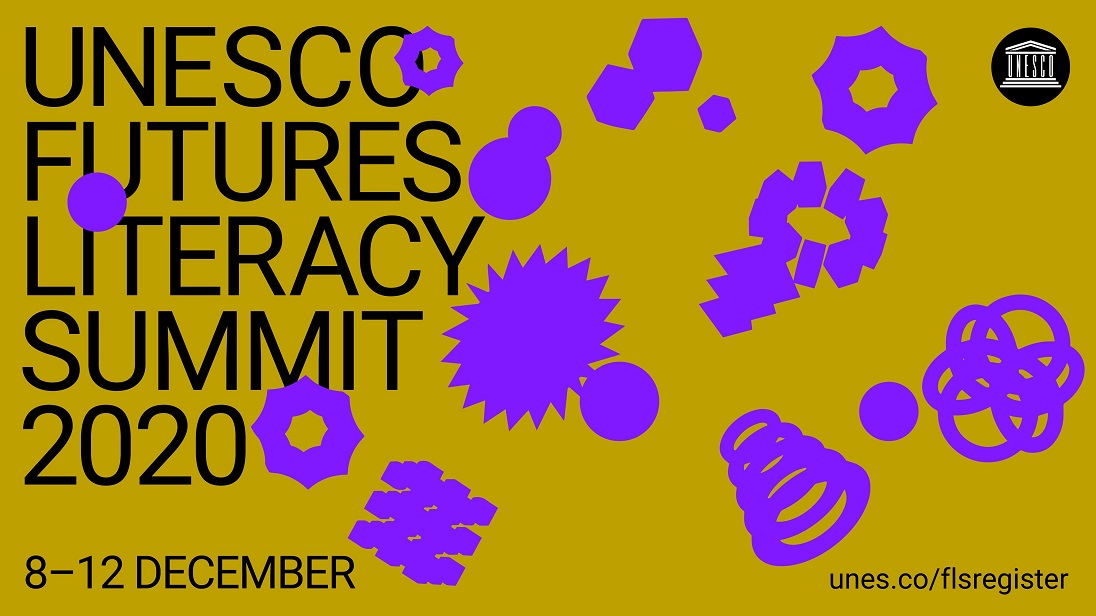 Poster for UNESCO’s Future Literacy Summit in 2020
Poster for UNESCO’s Future Literacy Summit in 2020You are the Deputy-Chair of the Strategic Foresight Team that has been recently established within the Presidency of the Greek Government. One of the first reports the team produced was on the seven megatrends that will impact Greece in the next two decades. Could you walk us through these megatrends?
Indeed, the Foresight Team in the Presidency of the Government has been only recently established, however it consists of a competent team of people that has taken over the task to increase capacity on foresight across the various government departments. From my point of view this is the biggest challenge for us in order to bring longtermism in the center of policy making. This is a difficult challenge because people tend to focus on short term objectives and benefits, and in addition politicians everywhere in the world tend to focus on initiatives that are in line with the short political cycles.
Well, although the team is young, we have started several projects and the megatrends report is one of them. The focus was drawn on seven megatrends that are expected to have a strong and long-term on the future of Greece:
–Climate Change and its expected impacts on food security, the natural environment, the economy and immigration.
-The Lack of Natural Resources, such as water or rare metals, that it is expected to drive research and policies for alternative materials, recycling, and cyclical economy in an effort to achieve strategic autonomy.
–Demographic Imbalances are expected to have a strong impact on the economic development and social inclusion, while new services and products will focus on the silver economy.
-Although the population is decreasing in some cities, Urbanization is a global megatrend and is expected to continue adding pressure on the urban environment and accelerating the development of smart services for the urban middle class.
-The Exponential Technological Growth mainly because of the radical developments in A.I., robotics, synthetic biology and brain research is changing everything, creating new challenges and opportunities for governments and companies.
-The increase of the global middle class is expected to be one of the biggest opportunities for capitalism as it is expected to catalyze the need of products and services, but also for policies to improve the urban environment.
-The last megatrend in our report, is the Global Power Shift from West to East, that requires an adaptation and a new strategy for governments but also for corporations.
The focus of our team at this point was to provide a concise report on selected key challenges, but also the report included a simple tool, the “futures wheel”, to allow policy makers to check the impact of these megatrends on their field of interest.

Well, in futures research black swans are those events that occur suddenly and have substantial impact on the broader system. Of course, there were studies in the past describing scenarios about the outburst of new pandemics, but exact prediction is not possible, so no preparatory actions were taken. In the same way, almost no preparatory actions have been taken so far for a rather large list of existential risks for humanity.
The main problem for tackling these risks, it is that the society is not ready to invest resources for events that have such low probability of occuring. It is even harder for policy makers to focus on catastrophic scenarios. We are anchored on what we know, what is more familiar. And this is problematic especially as we have recently experienced the impacts of the Covid-19 pandemic. Thus, for example it is extremely difficult today for politicians to explain to voters a substantial necessary investment for addressing future risks coming from the Artificial General Intelligenceor from the Artificial General Intelligence.
But we need to see things in an integrated way and acknowledge that the needs of current generations and future generations are not necessarily in conflict or all that different.

How could the shift of global power from West to East and China’s growing economic and political power affect European countries like Greece?
Well, we have been indeed experiencing the shift of global power from the West to Asia, but this is also partly because the West didn’t want to play this role, at least at the same extent. I am not sure if China is willing to exercise power in the same way. Having worked for more than a decade with China and spending considerable time there, I don’t believe that China is ready to fill the power vacuum in the same way. I believe that we shall expect a more complicated multi-polar global environment, with several global and regional players trying to exercise power.
In this environment, building regional alliances and dialogue is crucial for peace and prosperity. Moreover, as Greece is member of all the important international organizations like the EU and OECD, it is important to have in the future a more active role and increase our soft power, by coordinating working groups, taking over initiatives and raising support by other countries. This is our plan in the EU Foresight government network where we have taken the lead in two key initiatives.
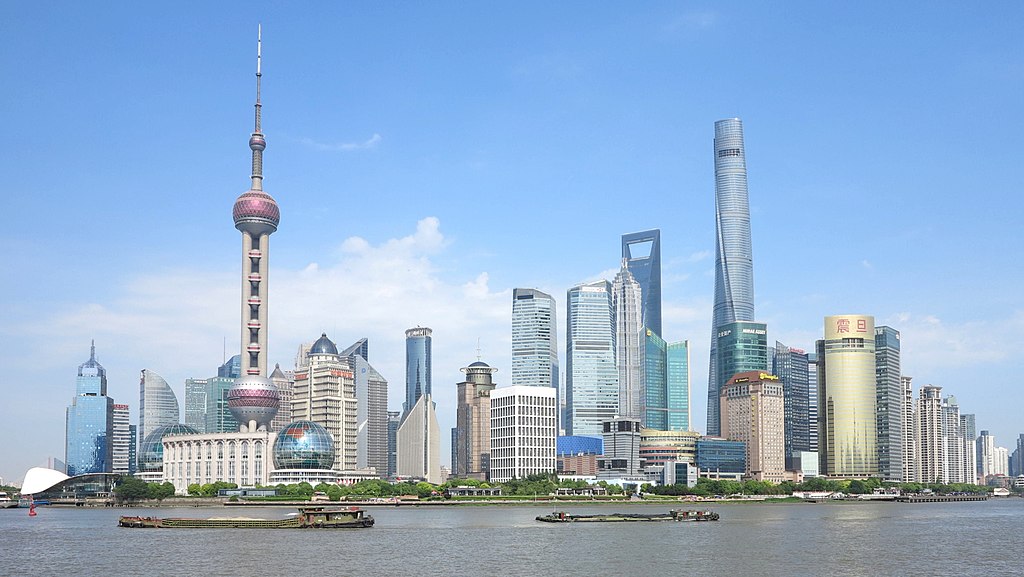
Thinker Yuval Harari has written on the possibility that information technology and biotechnology will createunprecedented upheavals in human society, eroding human agency and, possibly, liberal democracy. The younger generations on the other hand, worry intensely about climate change. Do you share these concerns?
I am actually sharing all these concerns! As the world becomes more complex and the technological changes more rapid, we will need to address new challenges and even existential risks. The Millennium Project, a global think tank performing research about the long-term future, has recently concluded a study for humanity’s future towards 2050, and identified similar anthropogenic risks, while also suggested several strategic actions to address them.
I am actually personally involved in a new initiative, where in an open letter to UN Secretary-General António Guterres, internet pioneer Vint Cerf, Nobel Prize Laureate Oscar Arias, and other technological, business, political, technological, environmental, and academic leaders around the world are calling for a new UN Office of Strategic Threats to coordinate global research on long-range strategic or existential threats to humanity, and to their prevention.
In terms of recognizing not only risks and challenges but also potential for growth and improvement, in what areas to you believe Greece has capacities that could be further developed?
The Foresight team in the Government, together with the UNESCO chair on Futures Research are currently working on two projects related to growth and long-term prosperity.
The first project is focusing on the innovation ecosystem of the Greece towards 2035, and aims to identify challenges but also potential opportunities for start-uppers and investing funds. The project runs in cooperation with the Hellenic Development Bank of Investments (HDBI) and aims to explore alternative scenarios and suggest strategies for supporting growth through innovation.
The second project aims on establishing a State of the Future Index in Greece. For decades, governments around the world have focused on economic growth and economic indicators, overlooking important parameters that make up reality and contribute to a better future. Today, in the face of environmental, social or health challenges, we can confidently answer that an index such as GDP, does not provide a clear image of a country’s prosperity, and much more of its future prospects.
Focusing on this need, we have selected the State of the Future Index (SOFI) methodology to compile such an indicator for Greece. SOFI-GR will provide an overview of the current situation in the country, always in relation to the future prospects. The SOFI is intended to show the directions and intensity of change and to identify the factors responsible. It provides a mechanism for studying the relationships among the items in a system — how making a single change ripples throughout a system, in other words, creating some positive and intended consequence as well as unintended results. The SOFI is useful for assessing the consequences of different policies and for showing the combined potential outcomes in an easy to understand fashion.
As the synthesis of the SOFI-GR is a participatory process, I am also taking this opportunity to invite your readers to help us produce the index by answering our questionnaire: https://ec.europa.eu/eusurvey/runner/SOFI_GR_Phase2
*Interview by: Ioulia Livaditi




